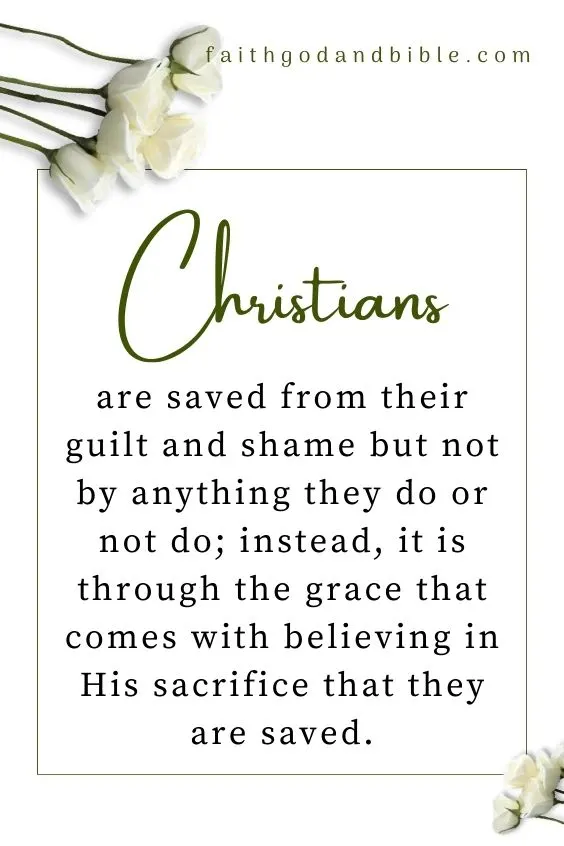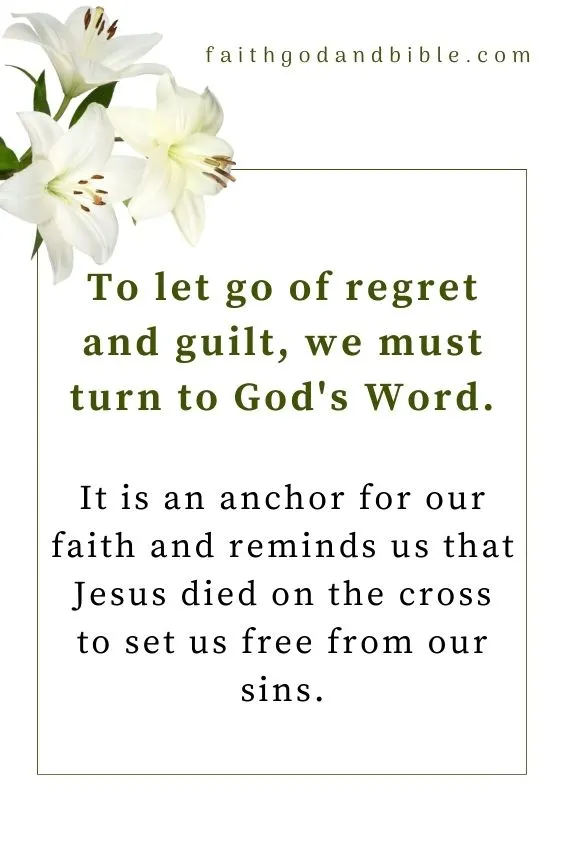For many Christians, feelings of regret and guilt about past decisions and circumstances can be a pervasive source of pain. Guilt can stem from our own failures or the actions of others, while regret ties into feelings of loss that may be difficult to move on from. However, it is important for followers of Christ to acknowledge and deal with these issues effectively as they work toward spiritual growth within their faith.
Thankfully, we can rely on our faith to handle any guilt we feel. To help you along your journey, we will explore how to address problems associated with guilt and regret and how to let go of the past. We can conquer our troubles by remembering the power found in God’s love and acknowledging the forgiveness we gained through His Son Jesus Christ. When we find that we can shift focus away from sorrowful regrets, then we can experience freedom as believers.
Let us use these God-given tools under our belt and seek to understand how God works within us. Then we will be ready to discover hope amidst difficulties and ultimately find relief from carrying burdensome memories.

How Do Christians Deal With Regret And Guilt
Understanding Regret and Guilt in Christianity

How Do Christians Deal With Regret And Guilt
As Christians, it is essential to understand how differing levels of regret and guilt can play a major role in our faith. By getting an accurate definition of these emotions and recognizing their importance, we can learn how best to navigate them within the Christian tradition.
Definition of Regret and Guilt
Regret is the unpleasant emotion that occurs when someone feels sorrow or remorse for a past action. It refers to the emotional feeling of wishing you had done something differently in the past. You might have missed an opportunity, made a mistake, or took actions with undesirable consequences.
When you feel guilty, on the other hand, you feel responsible for wrongful behavior. This can manifest in feelings of contrition, which often results from violating religious teachings and moral codes. In Christianity, guilt usually implies some degree of personal accountability either through sinning knowingly or by not following God’s laws exactly as prescribed in Scripture.
Importance of Addressing These Emotions
Regardless of what you have done or failed to do, you must recognize and address feelings of guilt and regret. Acknowledging these emotions can help you make amendments and learn from situations that caused pain or hardship. The Bible repeatedly emphasizes the power of repentance. When combined with faith in Jesus Christ, confessions of sin can lead to forgiveness, reconciliation, and joy in heaven (Luke 15:7 I tell you that in the same way there will be more rejoicing in heaven over one sinner who repents than over ninety-nine righteous persons who do not need to repent.).

How Do Christians Deal With Regret and Guilt?
Recognizing guilt helps us understand how our choices have impacted us and those around us. It also provides a sense of accountability, which is crucial for developing spiritual maturity. Through humble submission before God’s authority over all things, we can trust Him to not only redeem mistakes made in the past but also guide life decisions moving forward (Isaiah 45:15-18).
How to Deal with Regret and Guilt as a Christian

How Do Christians Deal With Regret And Guilt
As Christians, dealing with regret and guilt can be daunting. However, relying on Scripture and understanding Christ’s ultimate sacrifice provide the opportunity to recognize God’s power of forgiveness and redemption.
A key step toward dealing with regret involves confession. Reflecting on yourself and admitting offenses against God and others are necessary to receive restoration through grace (Psalm 32:3-5).
In Matthew 18:15-20, Jesus taught His followers how to properly deal with offences among members justly while maintaining relationships or restoring them after they had been damaged by hurtful actions.
Remembering Christ’s Sacrifice
Christians recognize Jesus Christ as “The Lamb of God who takes away the sin of the world” (John 1:29). All sins—past, present, and future—were paid for when Jesus died on the cross.
Christians are saved from their guilt and shame but not by anything they do or not do; instead, it is through the grace that comes with believing in His sacrifice that they are saved.

How Do Christians Deal With Regret and Guilt?
For anyone facing regrets and guilt about mistakes, these emotions can be overwhelming. However, remember what Jesus did for us more than 2,000 years ago on Calvary’s cross, where He gave Himself up in our place. This powerful perspective provides a way to see beyond regretful moments of the past.
This understanding will also help bring new hope as we accept His incredible gift of freedom. We can then move forward despite missteps and poor choices while also being able to reflect upon them without self-condemnation. Trust that the peace found when releasing ourselves into God’s restoring arms has power enough to heal hearts that have been shaken by painful memories.
Recognizing Forgiveness and Freedom in Christ
Christians can gain freedom and peace from feelings of guilt and regret by recognizing and accepting Christ’s forgiveness. His forgiveness is demonstrated throughout Scripture. For instance, Peter was given three opportunities after his denial of Jesus to confess his sin and know he had been forgiven (John 21:15-17).
Anyone who puts their trust in Him is granted access into His glory both now and forevermore through this ultimate act of love and mercy. Acknowledging this truth helps believers recognize how unconditional divine grace provides them with true freedom.
Letting Go and Moving Forward
Christians can find hope and peace in the knowledge that God is ever present, always forgiving those who seek Him for redemption. To let go of regret and guilt, we must turn to God’s Word. It is an anchor for our faith and reminds us that Jesus died on the cross to set us free from our sins.

How Do Christians Deal With Regret and Guilt?
The Good News proclaims that by trusting in Christ’s sacrifice, every Christian has access to complete forgiveness and freedom. When you recognize this truth through Scripture study or prayer, it chases away feelings of wretchedness or shame.
Our Mediator calls us into fellowship with Him if we humbly repent with contrite hearts. When we repent, we will feel buoyed by His promise of eternal joy and allow grace rather than struggle against bouts of self-condemnation due to sin-induced remorse or anguish.
Conclusion
Christians who are struggling with regret and guilt can find hope in the words of Jesus: “Come to me, all who labor and are heavy laden, and I will give you rest” (Matthew 11:28 ESV).

How Do Christians Deal With Regret and Guilt?
By understanding how God sees us through Christ’s sacrifice on the cross—loved creations whose every wrong move has been forgiven—and trusting in His Messiah, we may not be able to erase our mistakes, but we can still have faith that He brings freedom from regret and guilt.
Surrendering to Him enables us to find strength to let go of what is behind us and also be renewed enough for new beginnings.
Faith in Christ brings a newfound perspective on mistakes, which ultimately leads to emotional healing and lasting peace. It does not matter where hurt comes from or how long you hold on to it. If you strengthen your faith, you will find freedom from feelings of guilt or shame and find your way out of the darkness and into the light.
FAQs
1. How does the Bible deal with regret and guilt?
The Bible recognizes that Christians experience regret and guilt because of our sins but also provides comfort by reminding us that God will forgive us when we turn to Him.
2. What steps should a Christian take to move past regrets or feelings of guilt?
A Christian should first recognize that God, through His Son’s sacrifice on the cross, has paid for all human sinfulness so that we can be forgiven and reconciled with Him. Then the believer can look upon this extraordinary gift humbly yet confidently by embracing grace daily: Pray, read Scripture, and repent any sins committed against others (apology) or God (confession).
3. How would lack of forgiveness affect one’s relationship with God?
Not forgiving another person creates a barrier between you and God, which can lead to bitterness within your heart over time if left unresolved. This will obscure His ultimate purpose: that everyone may receive redemption in Christ to enter into eternal life in His Kingdom.
Leave a comment